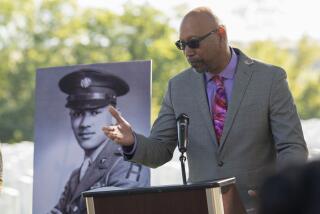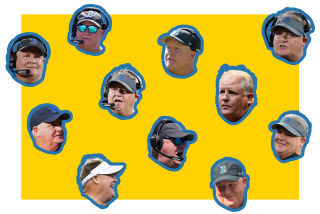Charles E. (Commando) Kelly, 64, Dies : Was One of the Nation’s Most-Decorated World War II Heroes
- Share via
PITTSBURGH — Funeral services for Charles E. (Commando) Kelly, one of the nation’s most celebrated World War II heroes, will be held here today.
Kelly, 64--the first enlisted man to receive the Medal of Honor for his bravery after the 36th Infantry Division’s 1943 landing at Salerno, Italy--died Friday at the Veterans’ Adminstration Hospital in Pittsburgh after an operation.
Kelly was known as “the one-man Army” after the campaign which claimed 7,000 lives among the division’s 15,000 men and officers. The division was attacked by German troops upon landing and ran out of ammunition within a a few days.
Guarded an Ammo Dump Kelly, a sergeant, volunteered to stay behind and guard an ammunition dump while his surviving fellow Americans began a slow retreat to safety. He used a Browning automatic rifle to single-handedly fight off an entire German platoon, killing more than 40 enemy soldiers, before withdrawing to his own lines.
His exploit became one of the most talked about heroics of the war and led Lt. Gen. Mark W. Clark, who commanded the 5th Army during the campaign, to praise Kelly for “fighting determination and intrepidity in battle,” in bestowing on him the nation’s highest honor.
Thousands filled the streets of Pittsburgh, Kelly’s hometown, when he returned home after his discharge in 1944. In addition to the Medal of Honor, he also won two Silver Stars, two Bronze Stars and British and French military medals.
Wrote a Book He earned $40,000 for a book about his wartime feats, “One Man’s War,” which later was made into a film. But soon after, he fell on hard times.
His first wife died of cancer and his second marriage ended in divorce. For a time he ran a gas station and then became a house painter. He moved to Louisville, Ky., in the 1950s, where he was reduced to living in a $20-a-month public housing project and found himself jobless.
A group of friends, however, collected funds to return him and his then-wife and their three sons and three daughters to Pittsburgh and helped him find work. At the time President Eisenhower telegraphed him a note of encouragement in which he said he was delighted to see his friends “rallying to your relief.”
Before entering the hospital, Kelly had continued to work as a self-employed house painter.
More to Read
Sign up for Essential California
The most important California stories and recommendations in your inbox every morning.
You may occasionally receive promotional content from the Los Angeles Times.













